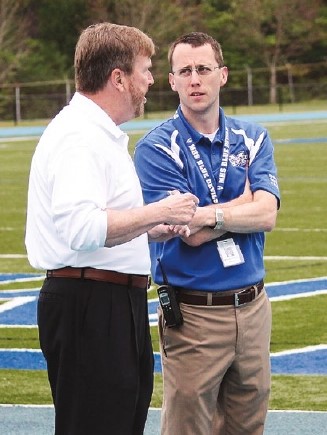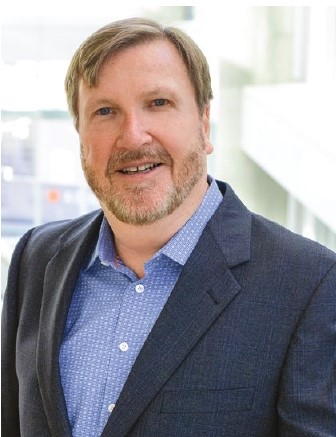Cultivating Capital Payoffs
March 01, 2017
When school systems go digital, it's the attention to human capital, social capital and decisional capital that will bring academic gains

About four years ago, Todd Wirt, the principal of Mooresville High School in North Carolina, came to my office to tell me he had decided to accept a job as assistant superintendent for academics in nearby Wake County. I had mixed emotions. I was happy for Todd, who had been named North Carolina Principal of the Year that fall and whose leadership had been instrumental in the early progress of our school district's digital conversion.
At the same time, I hated to see him leave a position leading a complex, 1,700-student high school through a pedagogical transformation. We would need a big-time leader who clearly embraced and understood the school’s trajectory. When I spoke with Stephen Mauney, a senior staff member (and now the superintendent in Mooresville), about the challenge of replacing Todd, he was confident we had the right leader ready to step up to the challenge.
Michael Royal, one of three assistant principals at Mooresville High School, had been mentored by Todd Wirt for this role, but we thought that process would be a little farther down the road, as Royal was a young-looking 28-year-old. It was pointed out to me that Royal had been the “detail leader” with the laptop deployment process and he also served as the math department chair before he became an administrator. We both acknowledged that Royal would provide ongoing support and direction with the central-office administrative team backing him.
And that is exactly what happened. Royal has thrived in the role as principal of Mooresville High School. He has led the school from digital conversion to digital transformation, not an easy task. By putting a MacBook Air in the hands of every student and providing teachers with the training to take full advantage of it as a learning tool, the district has been recognized as one of the leading digital innovation school systems and a national model by President Obama.
Mooresville High School continues to see outstanding academic achievement, ranked among the best in North Carolina, and attain record-setting scholarships for graduating seniors. The district maintains a lengthy waiting list of educators from elsewhere who are eager to see the district’s digital approach for themselves. Wirt has since moved into the superintendency of Orange County, N.C.
Fullan’s Framework
At first, you might view this situation as an illustration of leadership mentoring or effective succession planning. I would argue it is something more complex. This is really an example of a systemic school district effort to develop professional capital.
Michael Fullan, the noted author and authority on change knowledge, has constructed a leadership framework around the belief that professional capital and the three domains of human capital, social capital and decisional capital serve as the foundation for a school district’s digital and pedagogical transformation.
Fullan and I are incorporating this framework in a new co-authored book, Unstoppable Momentum: Digital Districts on the Move, which will be published in August. We have used some of the work in the Mooresville Graded School District during the years I served as superintendent and my colleague’s research as the premise. In the book, we focus on the power drive of building human, social and decisional capital as the catalyst for turbocharging digital and pedagogical transformation in a school district.
Human Capital

Superintendents and other school system leaders recognize that the overall quality of the employees in a district, the human capital, is so critical in how it affects every student. The work ethic, professional qualifications, skills and knowledge of individuals provides the possibilities for building great faculties and districtwide professional synergy.
In the Mooresville schools, we were not just looking to hire individuals with basic qualifications because we knew we needed teachers and administrators who were ready and willing to be leaders in our digital conversion. Whenever we hired assistant principals,
we were really looking for future principals, and as with the situation with the succession of Michael Royal into the principalship, it served us well on several occasions.
We also tried to hire and develop teachers who had strong convictions
about continuing to grow professionally, learn and collaborate with others. We saw teacher leaders make a huge difference in lifting student achievement and in navigating our digital conversion.
As important as the human capital is for a school district, the social capital is the real “turbo charge” for transformation of K-12 education.
Social Capital
I was incredibly proud of Mauney when he completed his doctoral degree in educational leadership while serving as executive director of secondary education for the Mooresville district. He had worked long and hard to complete the program, but we saw returns from his leadership development long before he received his degree.
In Mooresville, we took the concept of building social capital seriously and used various strategies to build our employees’ capacity to do their work, to collaborate and to be willing and ready to lead. We established masters and doctoral cohorts with local universities with clear alignment to our digital conversion and the quest to meet our district motto, “Every Child Every Day.”
Over the years, we saw most of our principals earn their doctoral degrees and numerous teachers earn their master’s degrees. This infusion of formal leadership development had a profound impact on the systemic social capital as our leaders evolved and new leaders developed. The board of education initiated early-release days to provide dedicated time each month to grow our social and human capital through various professional development activities.
The systemic variety of structured opportunities to build our social capital provided huge dividends. We also developed a summer institute to provide all teachers with specific professional growth opportunities and used teacher leaders to conduct the sessions, which in turn created another wave of leaders to influence the daily work of the district. We put special emphasis on the development of teacher leaders and ran a teacher leadership program throughout the year to further develop leadership skills in the course of working with students and colleagues.
This investment in multiple shared-learning activities resulted in growth in individual skills in both instruction and digital transformation, but even more importantly, we consciously worked on what Fullan refers to as “collaborative expertise.” This element of social capital is tremendously important toward meeting the challenges of new pedagogies that require students and teachers to work independently and collaboratively throughout each day. For administrators and teachers to work effectively and productively with colleagues, you have to dedicate time to working on being good teammates.
We invested in the growth of all employees and recognized the leadership and team conviction of our support staff at school board meetings. The systemic efforts to build the human and social capital helped develop a culture of “all in,“ where every day we saw examples of staff at all levels going above and beyond the call of duty. We shared in the synergy of working hard and working well together.

Building a strong foundation of social capital leads to the development and articulation of decisional capital, which is of paramount importance in a digital world where information is flowing to students and staff continuously, requiring the individual capacity to act quickly on information in productive ways.
Decisional Capital
A few years back, Scott Smith, the chief technology officer for the Mooresville schools, called me one evening to tell me our antivirus software had become a virus and was shutting down all our computers. In an all-digital district (we had not used textbooks in a couple of years), this was alarming news.
Smith and the tech staff worked throughout the next day and night to find a fix for the bug. In talking with some contacts from India, they found the fix at 2 a.m. on Saturday morning. The tech team had determined that every machine in the district would
have to be “touched” in order to apply the fix. The central-office team in Mooresville, along with principals, mobilized the staff and the logistics to get all of this done with little down time.
Throughout this stressful situation,
we were able to meet the challenge due in large part to the decisional capital we had developed. From our chief technology officer to principals and assistant principals, instructional technology and maintenance staff and numerous teachers, decisions
had to be made “on the fly,” and they were.
In the world of new pedagogies where students and teachers are working with dynamic information, developing the capacity for situational and formative decision making is necessary for both timely and productive work that capitalizes on this new confluence of energy. One area where we devoted a lot of focus was the formative use of student data to influence daily decisions on instruction. Over time, we developed the capacity of students to use the real-time data that they had access to.
I was proud of a 3rd-grade student who was sharing with a visiting superintendent his reading data profile that clearly indicated that he was working ahead of grade-level expectations. When the guest asked the little boy if he thought he could keep up the good work, the student replied, “I know I can because I am in charge of my learning.” The teacher, the guest and I all smiled in unison as witnesses of a profound affirmation of decisional capital and the positive implications.
Capital Effects
In the evolving instructional landscape in school districts across the United States, we are seeing massive infusions of digital resources. With this development, the public expects the investment should translate into improved teaching and learning. It is exciting to see the work of Fullan and others lead us to understand the key to our success in the pedagogical and digital transformation is not about hardware. It is more about heart ware. It is all about how we develop our teachers and principals to know how to work together and how to grow together.
As we inculcate a caring and committed sense of team and family and translate that to success for students and success for families, we can all take heart.
Author
Advertisement
Advertisement
Advertisement
Advertisement




